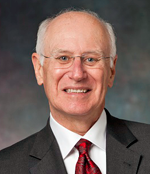 Bishop Doug Beacham
Bishop Doug Beacham LIGHT
The people who walked in darkness have seen a great light; those who dwelt in a land of deep darkness, on them has light shined. (Isaiah 9:2)
The light shines in the darkness, and the darkness has not overcome it. (John 1:5)
The Jewish holiday of Hanukkah is celebrated for eight days beginning on the 25th day of Kislev on the Hebrew calendar, which places it within the Christmas season. The holiday commemorates the cleansing and rededication of the Jerusalem temple in 165 B. C. after the Maccabean revolt against the Syrian king. Hanukkah is known as the Festival of Lights, and is celebrated by the nightly lighting of the Menorah candles.
For Christians, Christmas could also be known as the Festival of Lights. Christmas trees are decorated with electric lights of varying shapes, sizes and colors. Electric lights are also often strung outdoors on trees, eaves, windows and doors. Many stores erect impressive and expensive illumination displays to attract shoppers. Cities also decorate streets and sidewalks and buildings with elaborate light presentations at Christmas time.
This is an appropriate way to celebrate the holiday, for Christmas commemorates the day when the Light of heaven came down to become the Light of the world.
The Bible testifies that “God is light, and in Him is no darkness at all” (1 John 1:5). However, people have become “darkened in their understanding, alienated from the life of God because of the ignorance that is in them, due to their hardness of heart” (Ephesians 4:18).
Let’s face it: this world can be a very dark place. War and oppression flood nations with darkness. Crime and injustice flood societies with darkness. Unfaithfulness and abuse flood families with darkness. Fear and hatred flood hearts with darkness. Isaiah’s description is apt: because of sin, many people live and walk in darkness.
But on that first Christmas, the Light of God took human form, and was born into this dark world. “I am the Light of the world,” Jesus declared. “Whoever follows me will not walk in darkness, but will have the light of life” (John 8:12).
Only Christ brings the true light into the world, the light that comes from God. All other attempts to dispel the darkness– secular philosophy, scientific research, humanistic psychology, religious rituals, occult practices, new age spiritualism – are overwhelmed by the utter blackness of sin.
On that first Christmas, the magi of the Orient spied a special star in the heavens, and found it directing them to the birthplace of Jesus. But the fact is that every star in the heavens shines with the glory of God, and points to the Creator. And just as the lights of heaven testify to the glory of the Creator, the lights of Christmas testify to the glory of the Savior.
The unfathomable power and wisdom of God are revealed in the wonders of the universe He spoke into existence. But the birth of Jesus revealed something more: the immeasurable love and humility of God. Thus the lights of Christmas illuminate a new aspect of God’s glory.
God did more than merely shine His light upon us from afar. He came into our world to bring the light to us, to illumine each individual heart and life that is open to Him. No matter how dark our circumstances, there is no reason to despair. “The Light shines in the darkness, and the darkness has not overcome it” (John 1:5).
The lights of Christmas invite us to enter into the light of Christ, to make our home there, and to walk in that light day by day.
The people who walked in darkness have seen a great light; those who dwelt in a land of deep darkness, on them has light shined. (Isaiah 9:2)
The light shines in the darkness, and the darkness has not overcome it. (John 1:5)
The Jewish holiday of Hanukkah is celebrated for eight days beginning on the 25th day of Kislev on the Hebrew calendar, which places it within the Christmas season. The holiday commemorates the cleansing and rededication of the Jerusalem temple in 165 B. C. after the Maccabean revolt against the Syrian king. Hanukkah is known as the Festival of Lights, and is celebrated by the nightly lighting of the Menorah candles.
For Christians, Christmas could also be known as the Festival of Lights. Christmas trees are decorated with electric lights of varying shapes, sizes and colors. Electric lights are also often strung outdoors on trees, eaves, windows and doors. Many stores erect impressive and expensive illumination displays to attract shoppers. Cities also decorate streets and sidewalks and buildings with elaborate light presentations at Christmas time.
This is an appropriate way to celebrate the holiday, for Christmas commemorates the day when the Light of heaven came down to become the Light of the world.
The Bible testifies that “God is light, and in Him is no darkness at all” (1 John 1:5). However, people have become “darkened in their understanding, alienated from the life of God because of the ignorance that is in them, due to their hardness of heart” (Ephesians 4:18).
Let’s face it: this world can be a very dark place. War and oppression flood nations with darkness. Crime and injustice flood societies with darkness. Unfaithfulness and abuse flood families with darkness. Fear and hatred flood hearts with darkness. Isaiah’s description is apt: because of sin, many people live and walk in darkness.
But on that first Christmas, the Light of God took human form, and was born into this dark world. “I am the Light of the world,” Jesus declared. “Whoever follows me will not walk in darkness, but will have the light of life” (John 8:12).
Only Christ brings the true light into the world, the light that comes from God. All other attempts to dispel the darkness– secular philosophy, scientific research, humanistic psychology, religious rituals, occult practices, new age spiritualism – are overwhelmed by the utter blackness of sin.
On that first Christmas, the magi of the Orient spied a special star in the heavens, and found it directing them to the birthplace of Jesus. But the fact is that every star in the heavens shines with the glory of God, and points to the Creator. And just as the lights of heaven testify to the glory of the Creator, the lights of Christmas testify to the glory of the Savior.
The unfathomable power and wisdom of God are revealed in the wonders of the universe He spoke into existence. But the birth of Jesus revealed something more: the immeasurable love and humility of God. Thus the lights of Christmas illuminate a new aspect of God’s glory.
God did more than merely shine His light upon us from afar. He came into our world to bring the light to us, to illumine each individual heart and life that is open to Him. No matter how dark our circumstances, there is no reason to despair. “The Light shines in the darkness, and the darkness has not overcome it” (John 1:5).
The lights of Christmas invite us to enter into the light of Christ, to make our home there, and to walk in that light day by day.
